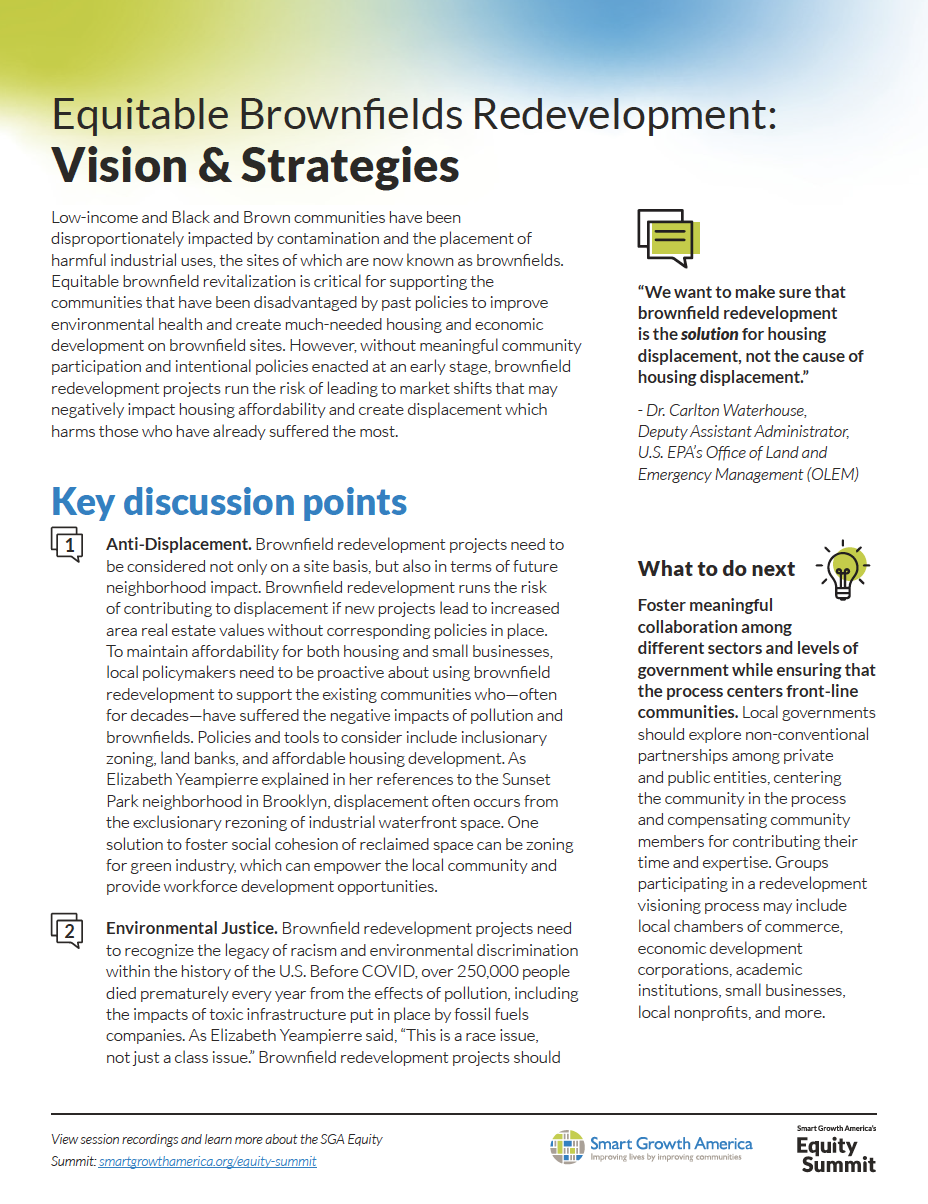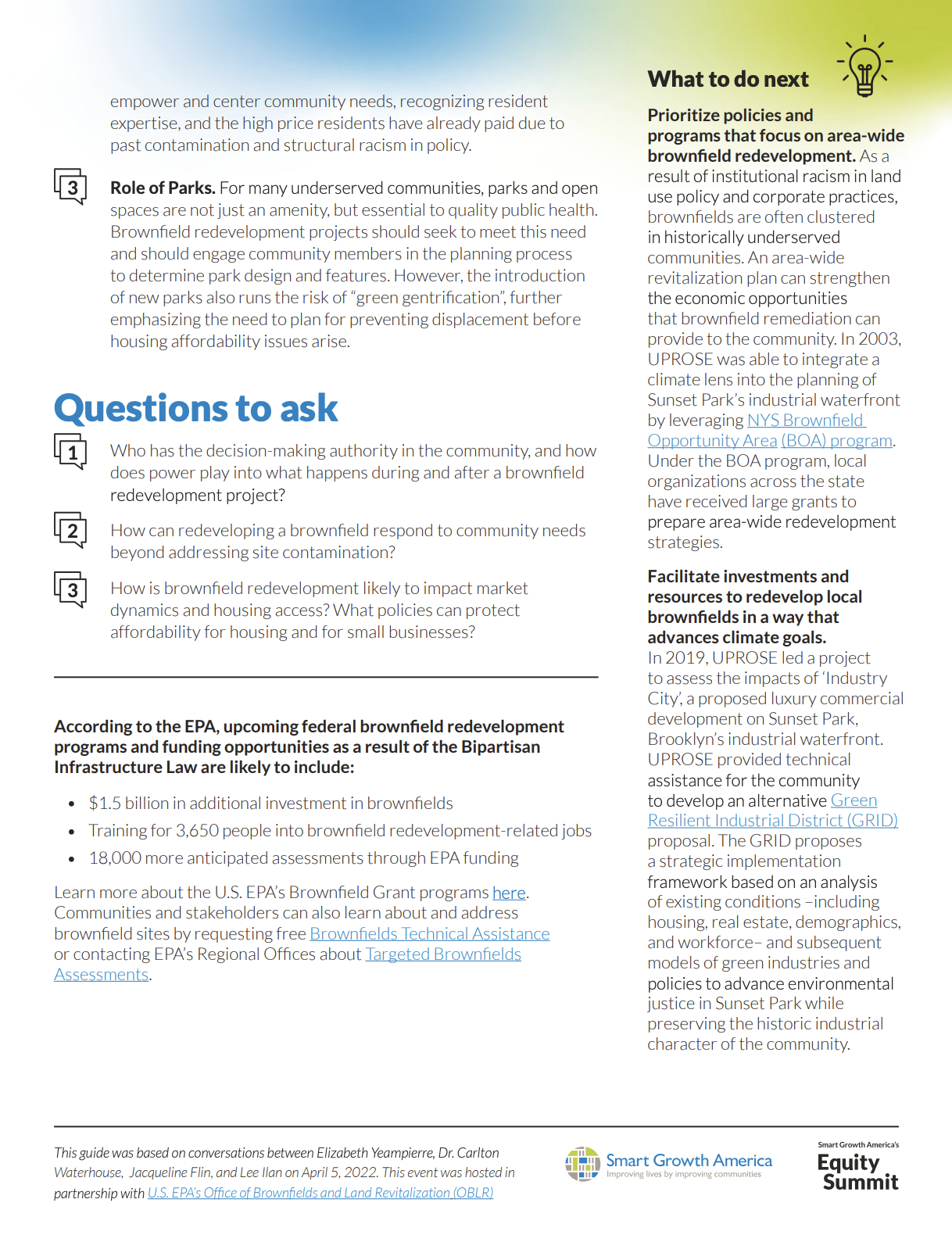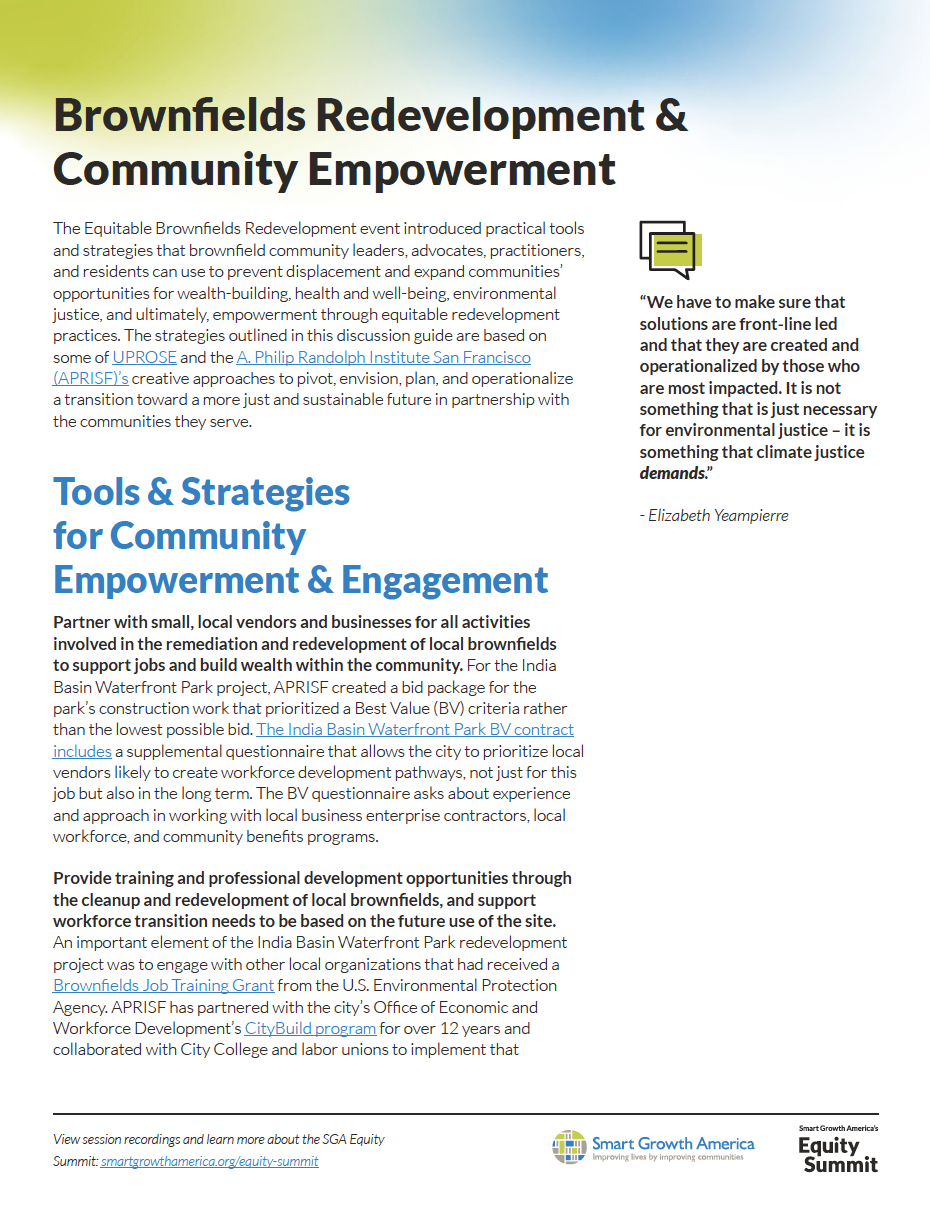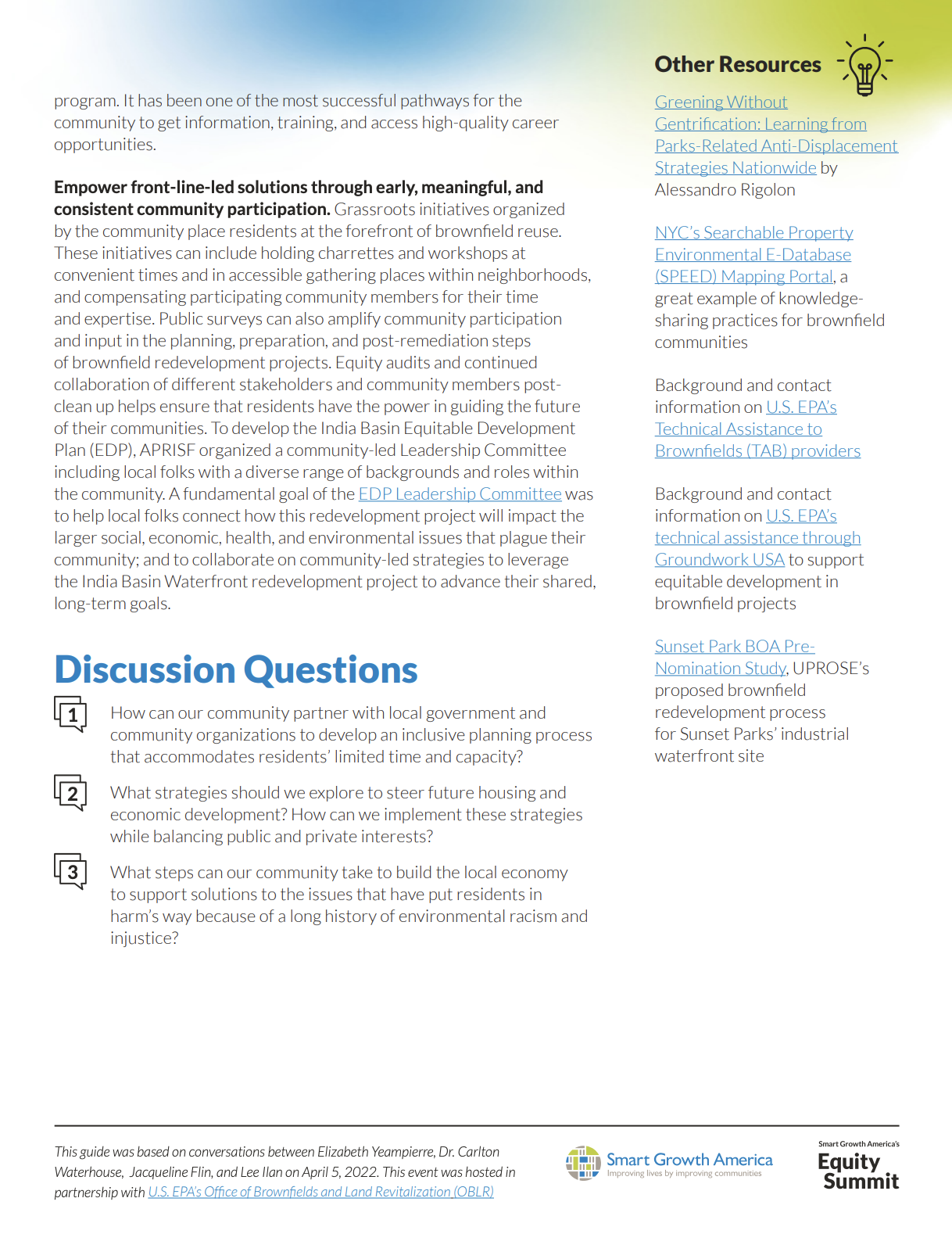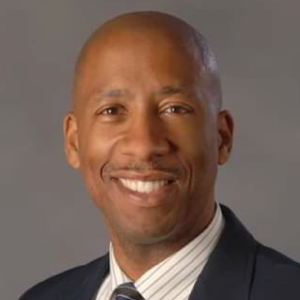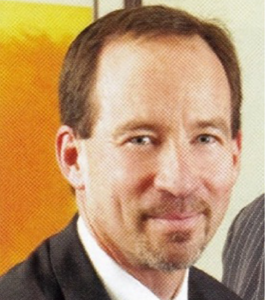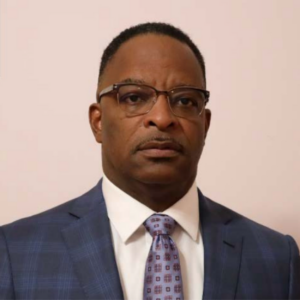
News
By Smart Growth America,
VIEW THIS PAGE IN SPANISH >

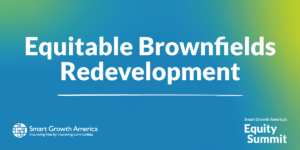
Learn tools and strategies for community wealth-building and preventing displacement at the Equitable Brownfields Redevelopment event, part of continued programming of Smart Growth America's Equity Summit.
When it comes to brownfield projects, local decision-makers are presented with a valuable opportunity to reshape their community’s approach to environmental justice and equitable development—whether through policy, financial incentives, or other interventions that set equitable standards for future brownfield projects. Brownfield clean-up and development are powerful tools to advance environmental justice by seeking to mitigate environmental hazards and promote healthier, vibrant communities in areas that may have been disadvantaged by the presence of one or more brownfield sites.
The National Brownfields Coalition hosted an event on April 5th focused on community wealth-building and displacement prevention in the context of brownfield redevelopment in partnership with the U.S. Environmental Protection Agency (EPA)'s Office of Brownfields and Land Revitalization (OBLR). This event was one of the many exciting opportunities hosted under SGA’s Equity Summit year-round programming. We hope you had as great of a time as we did listening to our guest speakers, including EPA leadership, Elizabeth Yeampierre, and Jackie Flin, and learning from their work to advance equitable and just brownfields redevelopment work in their communities.
Share what you learned
The Equitable Brownfields Redevelopment discussion guides are meant to help attendees revisit key insights and resources shared throughout the day. Make sure to download them here and discuss them with your colleagues, friends, and community!
Share: 
https://www.youtube.com/watch?v=elYaIeTkAFo&list=PLkIS9ahfD8Q9orBZ-0Uh1OUYI5EDlSp7B&index=4
https://www.youtube.com/watch?v=Vg_uUoDrhQk&list=PLkIS9ahfD8Q9orBZ-0Uh1OUYI5EDlSp7B&index=5
Vision & Strategies
Community Empowerment
Resources shared during the event
- Sunset Park: Brownfield Opportunity Area Nomination Study Report funded by the New York State Department of State led led by Elizabeth Yeampierre’s UPROSE;
- UPROSE’s Green Resilient Industrial District (G.R.I.D), the community-proposed alternative to Industry City’s proposal to rezone 3.3 million square feet of Sunset Park’s M-3 zoned industrial waterfront into luxury big box retail that strategically plans for existing and anticipated climate impacts in Sunset Park, Brooklyn by integrating climate adaptation, mitigation, and resilience;
- A list of Place-Based Community Brownfield Planning Areas in New York City hosted by the NYC Office of Environmental Remediation’s EPIC Community, which allows practitioners to identify and connect with brownfields-related projects and groups across the city;
- Jackie Flin’s case study, the India Basin Waterfront Park in San Francisco, which seeks to transform a neglected site left over from the industrial shipwrights’ era into a public park with an emphasis on public access, social equity, resiliency, and restoration;
- The National Brownfields Training Conference 2022 will be in Oklahoma City and detailed information can be found on the website––the largest effort for brownfields redevelopment and will be a huge opportunity to incorporate environmental justice efforts;
- The Climate Justice Alliance, a group of 82 urban and rural frontline communities, organizations, and supporting networks that seeks to build local alternatives that center traditional ecological and cultural knowledge and create a pathway for a regenerative future;
- The A. Pacific Randolph Institute’s website featuring all the affiliate organizations around the nation;
And finally, U.S. EPA’s Brownfields Technical Assistance, Training, and Research resources.
Speaker Line-Up
KEYNOTE
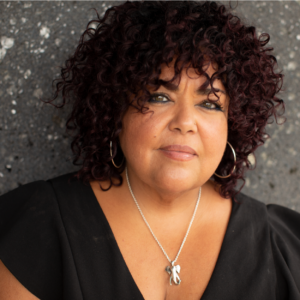
Elizabeth Yeampierre
Executive Director at UPROSE
Elizabeth Yeampierre is an internationally recognized Puerto Rican environmental/climate justice leader of African and Indigenous ancestry, born and raised in New York City. Elizabeth is co-chair of the Climate Justice Alliance, a national frontline led organization and Executive Director of UPROSE, Brooklyn's oldest Latino community-based organization. Elizabeth was the 1st Latina Chair of the USEPA National Environmental Justice Advisory Council and opening speaker for the first White House Council on Environmental Quality Forum on Environmental Justice under Obama. Elizabeth has been featured in the NY Times as a visionary paving the path to Climate Justice. She was named by Apolitical as Climate 100: The World’s Most Influential People in Climate Policy , also featured in Vogue as one of 13 Climate Warriors in the world and a recipient of the Frederick Douglass Abolitionist Award FD200. Recently, she has spoken at Oxford University, the Ethos Conference in Brazil and the Hague. View full bio.
Carlton Waterhouse
Deputy Assistant Administrator, U.S. EPA’s Office of Land and Emergency Management (OLEM)
Carlton Waterhouse serves as the Deputy Assistant Administrator for EPA’s Office of Land and Emergency Management. He was appointed by President Biden in February 2021. Carlton began his legal career as an attorney with EPA, where he served in the Office of Regional Counsel in Atlanta, Georgia, and the Office of General Counsel in Washington, D.C. Before rejoining EPA in 2021, he held a joint appointment as a professor at the Howard University School of Law and the Howard University School of Divinity. Carlton is a Fulbright research scholar and an international expert on environmental law and environmental justice.
David R. Lloyd
Director, U.S. EPA's Office of Brownfields and Land Revitalization (OBLR)
David Lloyd was born and raised in Carson City, Nevada. He graduated from George Washington University in 1985 with a BA in English Literature. In 1988, he graduated from Washington and Lee University in Lexington with a specialty in Real Estate and Corporate Law. Between 1989 and 1991, David was in private law practice in Carson City, Nevada, specializing in Real Estate and Corporate Law, with some work in commercial litigation. In 1991, he returned to Washington, DC and joined the Office of General Counsel at the U.S. Environmental Protection Agency. He was an attorney advisor and ultimately the Assistant General Counsel for Claims and Property Law. In 2000, he became Director of the EPA’s Facilities and Real Estate Division. David became a member of the Senior Executive Service in 2003. Since 2006, he has been the Director or EPA’s Office of Brownfields and Land Revitalization.
He is a proud Citizen of the Cherokee Nation and an avid equestrian. In addition to cooking and travel, he enjoys spending time with his horse, Trilby, and his dog, Quincy. David is a resident of the District of Columbia.
PANELISTS
Harold Mitchell
Executive Director and Founder at ReGenesis Community Development Corp.
Harold Mitchell Jr. is the Executive Director-ReGenesis Community Development Corporation, which promotes equitable development for Spartanburg's most underrepresented communities. Throughout its existence, it has sent shockwaves through the American environmental justice world with its resounding success in achieving its goals. To date, ReGenesis has leveraged an initial $20,000 EPA grant into over $300 million in private and public investment. The revitalization plan’s accomplishments include: the development of more than 500 affordable housing units, the establishment of ReGenesis Community Health Care, a healthcare system with seven locations, the creation of a retail center, transportation improvements, the construction of a green recreational facility, and job training and career opportunities for community residents. State Representative of South Carolina, House District 31 While serving as a Representative, from 2005 to 2017, many bills and legislation were passed in direct result of advocating for the Spartanburg Community.
Mr. Mitchell serves in the NBC's Environmental Justice and Public Health Committee.
Lee Ilan
Chief of Planning, NYC Mayor's Office of Environmental Remediation
Lee Ilan is the Chief of Planning at the New York City Mayor’s Office of Environmental Remediation, where she encourages cleanup and redevelopment of contaminated land. Her focus is on community engagement, grant management, the SPEED environmental mapping portal, intergovernmental issues, communications, and social media. She has worked on brownfields for the City for nearly two decades years and served on the board of NALGEP (National Association of Local Government Environmental Professionals) for six years. Previously, Lee was a commercial recycling consultant and a parks advocate in New York City. She holds a BA in Political Science from Columbia College, Columbia University.
Ms. Ilan currently serves in the Steering Committee of the National Brownfields Coalition as well as the Environmental Justice & Public Health Committee and Membership & Communications Committee. Most recently, she provided testimony in a hearing before the Subcommittee on Environment and Climate Change of the House Committee on Energy and Commerce on behalf of the Coalition.
Jacqueline Flin
Executive Director, A. Philip Randolph Institute San Francisco
Executive Director Jacqueline Flin was born in San Francisco, CA. She was raised the middle-child with two brothers, by a unionist father and an immigrant mother. She graduated from St. Mary’s College Preparatory High School in Berkeley, CA and went on to receive her B.S. degree in Cellular Biology from the University of California at Davis.
Flin began volunteering for the A. Philip Randolph Institute San Francisco as a youth leader participating in efforts to educate low-income communities about local elections and voting initiatives. She was then hired as a receptionist at the California Labor Federation, an organization dedicated to promoting and defending the interests of working people and their families for the betterment of California’s communities. After a brief career in the biological science field, in 2009, she returned to San Francisco in a leadership role as the Executive Director of the A. Philip Randolph Institute San Francisco.
In the time she served as Executive Director, she has expanded the organization’s capacity to offer public services that include: Workforce Development, Youth Career and Leadership Development, and Equity Development Strategies. She established public and private partnerships that support invest directly in the Bayview Hunters Point. She has a network of relationships with City and County departments, unions, local businesses, community based organizations, service providers, and residents. She is committed to building the community through organizing and leadership.
VIEW THIS PAGE IN SPANISH >
The National Brownfields Coalition is a non-partisan alliance of public interest organizations, academics, as well as public and private sector professionals who develop and advocate for policies and practices that support the responsible cleanup and reuse of underutilized or environmentally impacted land. Our mission is to educate, advocate, and convene stakeholders nationally to advance the social, economic, public health, environmental, and quality of life benefits of environmental cleanup and reuse for all communities.
This virtual event is brought to you in partnership with the U.S. EPA Office of Brownfields and Land Revitalization (OBLR), which provides grants and technical assistance to communities, states, tribes and others to assess, safely clean up and sustainably reuse contaminated properties.

© 2026 Smart Growth America. All rights reserved
Site By3Lane Marketing







